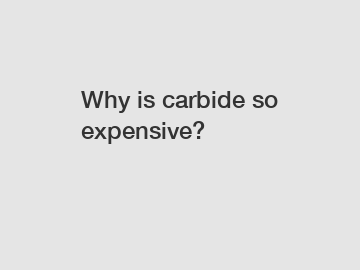Why is carbide so expensive?
Why is Carbide So Expensive?
Carbide, a compound of carbon and a lower-valence metal, is widely used in various industries for its excellent hardness and resistance to wear. However, the high cost of carbide often raises questions. In this article, we will delve into the reasons behind carbide's expensive price tag. Let's explore why carbide is so costly, and whether its benefits justify the investment.
1. Raw Material Scarcity:

One significant factor contributing to the high cost of carbide is the scarcity of its raw materials. Carbide is primarily made using tungsten or titanium, both of which are not abundant resources. The limited availability of these metals on Earth drives up the prices, making the production of carbide expensive.
2. Complex Manufacturing Process:
The manufacturing process of carbide is intricate and involves multiple steps. Initially, tungsten or titanium is combined with carbon under high temperatures and pressures, forming a powdered mixture. This mixture is then compressed into solid forms and subjected to sintering, a process where the powder is heated at extremely high temperatures until it fuses together, forming solid carbide parts. This intricate process requires energy-intensive equipment and skilled personnel, which adds to the overall cost.
3. High Quality Standards:
Carbide is renowned for its exceptional hardness and resistance to wear, making it a popular choice in high-performance applications. However, maintaining these superior properties requires strict quality control measures during the manufacturing process. The use of high-quality raw materials, precision in mixing the components, and controlled sintering conditions are critical to achieving desirable carbide properties. Adhering to these quality standards adds to the cost of producing carbide.
4. Specialized Uses:
Carbide finds applications in various industries, including mining, aerospace, and medical. Its superior properties make it ideal for tools such as cutting inserts, drills, and end mills. However, these specialized applications further contribute to the high cost of carbide. The demand for carbide in these industries is relatively small compared to other materials, limiting economies of scale. Additionally, the increasing complexity of applications requires continuous research and development, leading to higher production costs.
5. Environmental Considerations:
Tungsten mining, one of the primary sources for carbide production, can have adverse environmental impacts. Mining activities, especially in regions where regulations may be lax, can result in deforestation, air and water pollution, and disturbance to ecosystems. Stringent environmental regulations and sustainable mining practices drive up the production costs of carbide. However, these considerations are vital for ensuring a sustainable future and minimizing the ecological impact of carbide production.
Conclusion:
Carbide's high price is a result of multiple factors, including the scarcity of raw materials, complex manufacturing processes, stringent quality standards, specialized applications, and environmental considerations. Despite its expense, carbide remains invaluable in industries where hardness and wear resistance are crucial. The development of alternative materials may offer cost-effective solutions in the future, but until then, carbide continues to be an essential and costly resource for numerous applications.
If you want to learn more, please visit our website castable refractory cement, industrial furnaces refractory bricks, high alumina bricks.
173
0
0


Comments
All Comments (0)